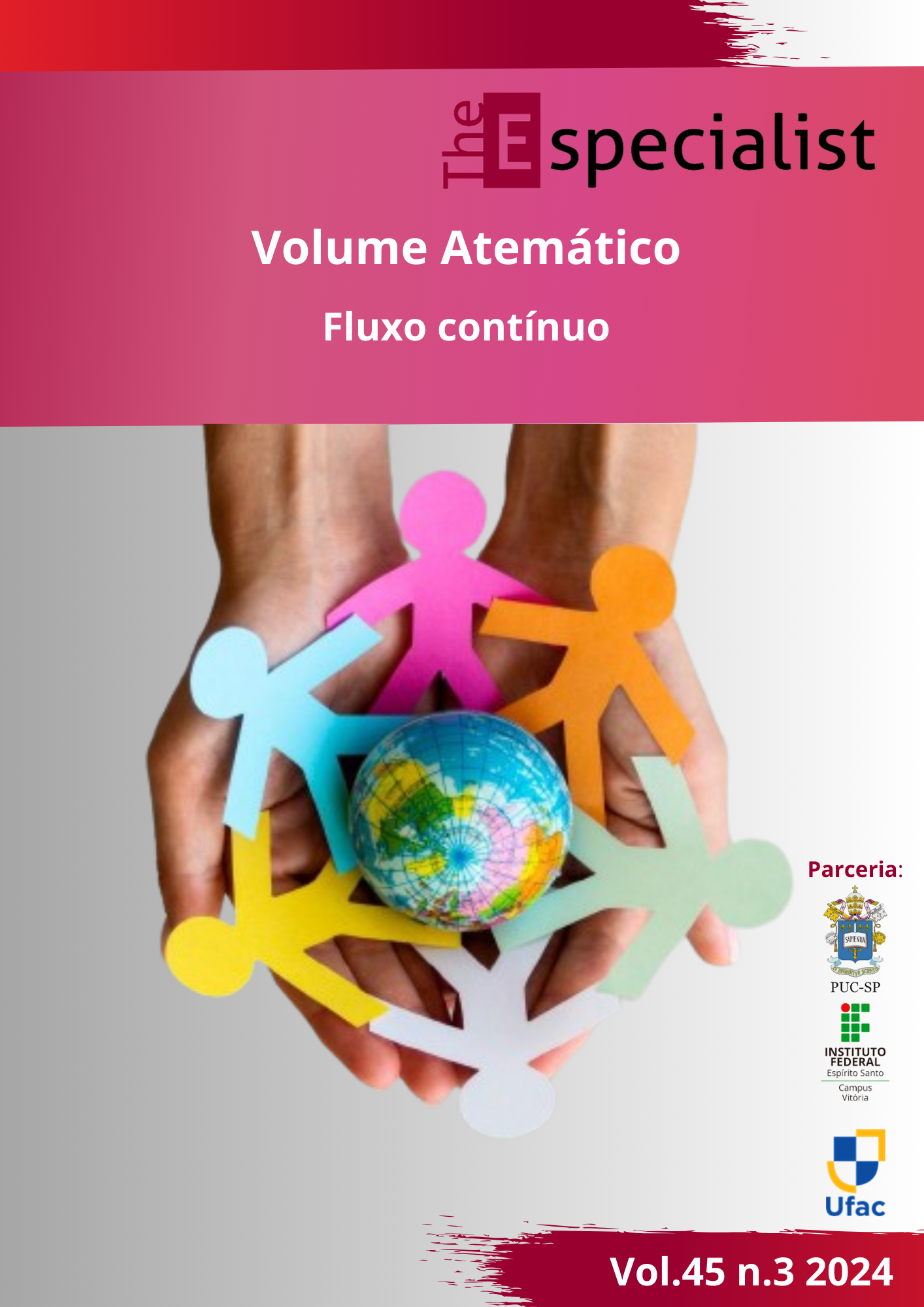AI in the Teaching-Learning of Languages
DOI:
https://doi.org/10.23925/2318-7115.2024v45i3e63941Keywords:
Artificial Intelligence, Artificial Intelligence in Education, Tools and Platforms, Challenges and LimitationsAbstract
The aim of this paper is to present the concepts of artificial intelligence (AI) (UNESCO, 2019 a,b, 2021; Luckin, 2019, 2021; Luckin, George & Cukurova, 2022) and artificial intelligence in education (AIEd) and how this autonomous adaptive system can help all agents in the teaching-learning process. We will present a few tools and platforms that can be used for teaching-learning of languages, challenges and limitations related to the use of AIEd (Luckin et al., 2016). This work is relevant as AI impacts social relations, various organizational processes and education. Furthermore, the Beijing consensus (UNESCO, 2019c) proposes the integration of AI technologies in education to help us achieve the sustainable development goals and the 2030 agenda for education (UNESCO, 2017).
References
AHMAD, Sayed F. et al. Artificial intelligence and its role in education. Sustainability, Basil, v. 13, n. 22, p. 1-11, 2021. Disponível em: https://www.mdpi.com/2071-1050/13/22/12902. Acesso em: 20 maio. 2021. https://doi.org/10.3390/su132212902.
ALKHAWAJA, Linda. Artificial intelligence in education: harnessing its power as a valuable tool, not an adversary. International Journal of Computer-Assisted Language Learning and Teaching (IJCALLT), Hershey, v. 13, n. 1, p. 1-22, 2023. Disponível em: https://www.igi-global.com/article/artificial-intelligence-in-education/329607. Acesso em: 13 abr. 2023. http://doi.org/10.4018/IJCALLT.329607.
CHEN, Xieling. et al. Application and theory gaps during the rise of artificial intelligence in education. Computers and Education: Artificial Intelligence, v. 1, p. 1-20, 2020. Disponível em: https://www.sciencedirect.com/science/article/pii/S2666920X20300023?via%3Dihub. Acesso em: 1 set. 2023.
https://doi.org/10.1016/j.caeai.2020.100002.
COUNCIL OF EUROPE. What’s AI?. 2023. Disponível em: https://www.coe.int/en/web/artificial-intelligence/what-is-ai. Acesso em: 10 ago. 2023.
COPE, Bill. et al. Artificial intelligence for education: Knowledge and its assessment in AI-enabled learning ecologies. Educational Philosophy and Theory, London, v. 53, n. 12, p. 1229-1245, 2021. Disponível em: https://www.tandfonline.com/action/doSearch?
AllField=Artificial+intelligence+for+education%3A+Knowledge+and+its+assessment+in+AI-enabled+learning+ecologies.+&SeriesKey=rept20. Acesso em: 3 maio 2023. https://doi.org/10.1080/00131857.2020.1728732.
COSTA JÚNIOR, João F. et al. A inteligência artificial como ferramenta de apoio no ensino superior. Rebena - Revista Brasileira de Ensino e Aprendizagem, Rio Largo, v. 6, p. 246-269, 2023. Disponível em: https://rebena.emnuvens.com.br/revista/article/view/111. Acesso em: 3 ago. 2023.
DEWI, Hemas K.. et al. The use of AI (Artificial Intelligence) in English learning among university student: case study in English department, Universitas Airlangga. OSF Preprints, 2021. Disponível em: https://osf.io/preprints/osf/sdntr. Acesso em: 3 jun. 2023. https://doi.org/10.31219/osf.io/sdntr.
DOS SANTOS, Ademar A. et al. A aplicação da inteligência artificial (IA) na educação e suas tendências atuais. Cuadernos de Educación y Desarrollo, Portugal, v. 15, n. 2, p. 1155–1172, 2023. Disponível em: https://ojs.europubpublications.com/ojs/index.php/ced/article/view/1030. Acesso em: 6 jun. 2023. https://doi.org/10.55905/cuadv15n2-011.
KAUFMAN, Dora. Desmistificando a inteligência artificial. Belo Horizonte: Autêntica, 2022.
LATIF, Ehsan. et al. Artificial general intelligence (AGI) for education. arXiv preprint arXiv:2304.12479, v. 2, p. 1-34, 2023. Disponível em: https://arxiv.org/abs/2304.12479. Acesso em: 7 ago. 2023. https://doi.org/10.48550/arXiv.2304.12479.
LUCKIN, Rose. et al. Intelligence unleashed. An argument for AI in Education. London: Pearson, 2016.
LUCKIN, Rose. et al. AI for school teachers. Oxon: Taylor & Francis Group, 2022.
LUCKIN, Rose. Towards artificial intelligence-based assessment systems. Nature Human Behaviour, v. 1, p. 1-3, 2017. Disponível em: https://www.nature.com/articles/s41562-016-0028. Acesso em: 15 maio 2023. https://doi.org/10.1038/s41562-016-0028.
LOPES, Mauricio. et al. LibrAR: aplicativo de aprendizagem de libras usando realidade aumentada e realidade virtual em dispositivo móvel. Repositório Institucional, São Carlos, s.l., p. 946 – 955, 2018. Disponível em: http://www.repositorio.ufc.br/handle/riufc/44113. Acesso em: 15 set. 2023.
MANNING, Christopher. Artificial intelligence definitions. Stanford University Human-Centered Artificial Intelligence (HAI), Stanford, v. 1.2, 2022. Disponível em: https://hai.stanford.edu/sites/default/files/2023-03/AI-Key-Terms-Glossary-Definition.pdf. Acesso em: 29 jul. 2023.
MARKETSANDMARKETS RESEARCH. AI in Education Market by Technology l 2023. Disponível em: https://www.marketsandmarkets.com/Market-Reports/ai-in-education-market-200371366.html. Acesso em: 13 ago. 2023.
NIRALA, Krishna K. et al. A survey on providing customer and public administration based services using AI: chatbot. Multimedia Tools and Applications, v. 81, p. 22215–22246, 2022. Disponível em: https://link.springer.com/article/10.1007/s11042-021-11458-y. Acesso em: 7 jun. 2023. http://dx.doi.org/10.1007/s11042-021-11458-y.
SADIKU, Mathew N. O. et al. Artificial intelligence in social media. International Journal of Scientific Advances, v. 2, n. 1, p. 15–20, 2021. Disponível em: https://www.ijscia.com/wp-content/uploads/2021/01/Volume2-Issue1-Jan-Feb-No.36-15-20.pdf. Acesso em: 5 jun. 2023.
SHEIKH, Haroon. et al. Artificial intelligence: definition and background. In: SHEIKH, H.; PRINS, C. & SCHRIJVERS, E. (Orgs.). Mission AI. Research for Policy. Cham: Springer, 2023. p. 15-41.
SOPRANA, Paula. Inteligência artificial deixará o ensino mais personalizado no Brasil, diz pesquisa. Folha de São Paulo Online, São Paulo, 20 fev. 2019. Disponível em: https://www1.folha.uol.com.br/tec/2019/02/inteligencia-artificial-deixara-ensino-mais-personalizado-no-brasil-diz-pesquisa.shtml. Acesso em: 19 jul. 2023.
ST-HILAIRE, Francois. et al. A new era: intelligent tutoring systems will transform online learning for millions. Computer Science > Computers and Society, p. 1–9, 2022. Disponível em: https://arxiv.org/abs/2203.03724. Acesso em: 4 abr. 2023.
UNESCO. Education for sustainable development goals: learning objectives. Paris: United Nations Educational, Scientific and Cultural Organization, 2017.
UNESCO. Artificial intelligence for sustainable development. Synthesis report. Mobile learning week 2019. Paris: United Nations Educational, Scientific and Cultural Organization, 2019a.
UNESCO. Artificial intelligence in education: challenges and opportunities for sustainable development. Paris: United Nations Educational, Scientific and Cultural Organization, 2019b.
UNESCO. Consenso de Beijing sobre a inteligência artificial e a educação. Synthesis report. Mobile learning week 2019. Paris: United Nations Educational, Scientific and Cultural Organization, 2019c.
UNESCO. AI and education. Guidance for policy-makers. Paris: United Nations Educational, Scientific and Cultural Organization, 2021.
ZHANG, Xiaohua. et al. College English smart classroom teaching model based on artificial intelligence technology in mobile information systems. Mobile Information Systems, vol. 2021, p. 1-12. Disponível em: https://www.hindawi.com/journals/misy/2021/5644604/. Acesso em: 22 jul. 2023. https://doi.org/10.1155/2021/5644604.
Downloads
Published
How to Cite
Issue
Section
License
Copyright (c) 2024 The ESPecialist

This work is licensed under a Creative Commons Attribution 4.0 International License.
The authors grant the journal all copyrights relating to the published works. The concepts issued in signed articles are the absolute and exclusive responsibility of their authors.


 Esta obra está licenciada com uma Licença
Esta obra está licenciada com uma Licença 